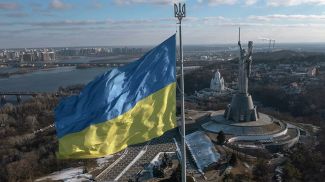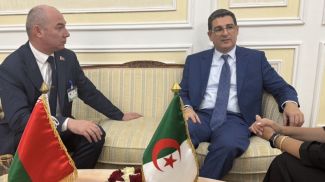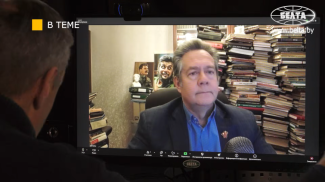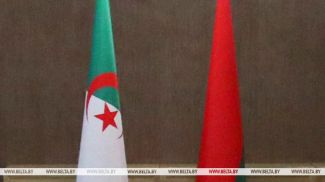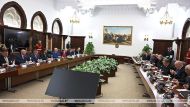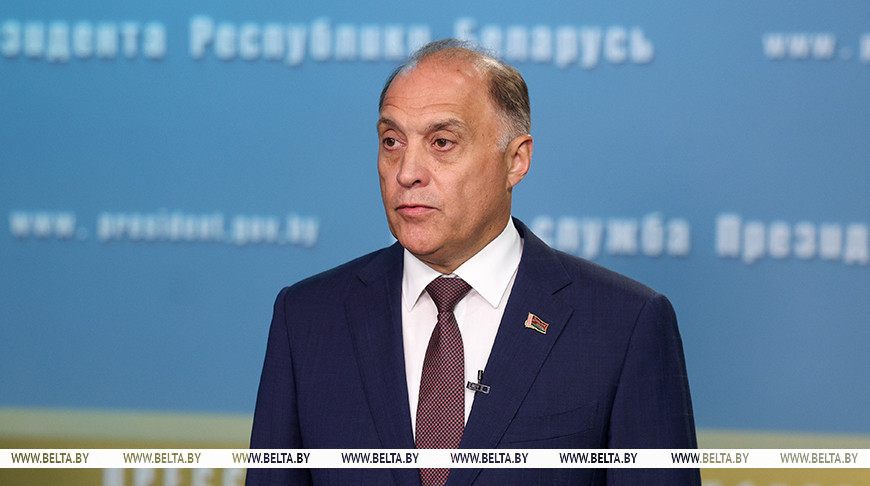
Aleksandr Volfovich
MINSK, 21 August (BelTA) – The possibility of arming multiple-launch rocket systems (MLRS) Polonez with nuclear warheads is under consideration, BelTA learned from State Secretary of the Security Council Aleksandr Volfovich after Belarus President Aleksandr Lukashenko hosted a government conference to discuss missile production on 21 August.
Aleksandr Volfovich pointed out that the Polonez missile system had been created together with the People’s Republic of China. Later on the system was successfully modernized by Belarusian enterprises. “At present it is a state-of-the-art complex. The missile range was 200km. At present it is 300km. It is a high-precision weapon. Certainly, any weapon needs corrections and adjustments. We are already considering the possibility of arming these missiles with nuclear warheads. And how to integrate technologies [of Russian ballistic missiles] Oreshnik possibly into some joint missiles. How to make adjustments together with Russia now and work in this direction in order to create a modern missile,” the state secretary of the Security Council said.
He stressed that threatening anyone is not the point: “We look at how our neighbors, western countries, Americans create similar systems with the effective range of 600km and more. Certainly, we need to catch up and advance in this field.”
This is why the state secretary of the Security Council drew attention to the negative dynamics of military threats. Western countries have substantially increased defense spending and are getting militarized. Aleksandr Volfovich remarked that all of it forces one to pay the most serious attention to matters of the defensive ability of the Belarusian state.
“Yes, the president says that we don’t threaten anyone. But the defense of our state, of national interests, and of the nation is the cornerstone,” Aleksandr Volfovich assured. “Matters concerning an increase in our might, our defensive ability are very important. I guess matters of strategic deterrence are coming to the forefront.”
According to the state secretary of the Security Council, those include matters concerning missile production. Aleksandr Volfovich stated that missile forces represent one of the most important components of Belarus’ Armed Forces. This is why they need to live up to requirements of the time and be capable of carrying out missions in compliance with new forms and methods of warfare.
Aleksandr Volfovich also pointed out that Belarus had started making missiles virtually from scratch: “Belarus had never made missiles. We’d never done that. We are a peaceful country. We made tractors, BelAZ trucks, MAZ trucks, buses. But life forces every state to think about its defensive ability. This is why the decision was made to create missiles of our own.”
The state secretary added that the head of state has a firm grasp of these matters, this is why the conversation had been focused.
Chairman of the State Authority for Military Industry of Belarus Dmitry Pantus presented a report on what has been accomplished over time.
Dmitry Pantus clarified that during the conference the president had been informed about results of the work to develop a missile manufacturing industry in Belarus in the last five years. Other projects were also successfully implemented in this period, including the creation of the grenade launcher complex Sapfir, the air defense missile complex Buk MB-2, which has been commissioned by the Belarusian army, with Belarus’ first air defense guided missile with the effective range of over 70km. “The complex is made in batches today. Interest in it is great,” Dmitry Pantus said.
“Later on we continued working on an entire series of other confidential instructions,” he added. “We have done a lot of work to create a missile engineering school. We continued training specialists, including in Russia. At present many of them already work at Belarusian enterprises. Efforts to develop the Belarusian missile engineering school will continue,” the chairman of the State Authority for Military Industry assured.
The conference also touched upon the possibility of developing missile production and what new projects may be potentially interesting for realization in Belarus. “The head of state gave instructions to take another look [at these matters] together with our Armed Forces, with Russian partners and submit final proposals,” Dmitry Pantus informed.





